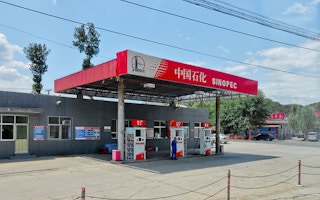China Petroleum & Chemical Corp, the world’s biggest oil refiner, is reviving a long-mooted initial public offering of its retail business that could raise as much as $10 billion, people familiar with the matter said.
The mainland’s State-owned oil company, known as Sinopec, has asked banks to submit proposals by this month for roles to manage a potential Hong Kong listing next year, according to the people, who asked not to be identified as the information is private. Sinopec shares jumped 4.3 per cent to HK$5.86 (75 cents) at 10:55 am on Wednesday in Hong Kong, headed for the biggest gain since April.
Sinopec’s retail operations include more than 30,500 fuel stations under its own brand as well as a network of convenience stores. It proposed a listing of the retail business in 2014, when it sold a 29.99 per cent stake for 107 billion yuan ($15.5 billion) to a group of investors including China Life Insurance Co and billionaire Guo Guangchang’s Fosun International Ltd.
“Low crude prices and a shaky stock market in Hong Kong this year were the reasons Sinopec hasn’t tried aggressively to list,” Anna Yu, a Hong Kong-based analyst at China Merchants Securities (HK) Co, said on Wednesday. “It looks more reasonable now for them to try next year if oil prices rise and the appetite for IPOs recovers as many expect.”
“
Sinopec has high expectations for the unit, as gas stations, by any standard, are the crown jewels of all Sinopec’s assets.
Anna Yu, analyst, China Merchants Securities Company
‘High expectations’
The oil refiner’s chairman, Fu Chengyu, retired from Sinopec in May last year and was replaced by Wang Yupu, who had been deputy head of the Chinese Academy of Engineering. No final decisions have been made, and Sinopec may also decide against floating the business if market conditions are unfavorable, the people said.
A Beijing-based spokesman for Sinopec declined to comment.
The company’s retail gasoline sales gained 9.8 per cent last year to 58 million metric tons, according to its annual report. Its non-fuel transactions jumped 45 per cent to 24.8 billion yuan, as it increased cooperation with internet companies.
“Sinopec has high expectations for the unit, as gas stations, by any standard, are the crown jewels of all Sinopec’s assets,” China Merchants’s Yu said. “It generates steady cash flow and is little affected by oil-price fluctuation.”
Growth targets
The retail business isn’t being properly valued within Sinopec, and some of the unit’s outside shareholders may be pushing for a listing to monetise their investments, according to Neil Beveridge, a senior analyst at Sanford C. Bernstein & Co in Hong Kong.
“The real profit driver in those networks is non-fuel retail,” Beveridge said on Wednesday. “Spinning off these businesses is a better way of enhancing the value of these assets.”
Chinese energy giants have sold parts of their extensive pipeline assets to cut costs and meet government-set growth targets as lower oil prices hurt earnings.
This story was published with permission from China.org.cn










